Unit 6 Period 2 Words 同步词汇及拓展延伸-六年级英语上册同步精品课堂(牛津上海版)课件(共16张PPT)
文档属性
| 名称 | Unit 6 Period 2 Words 同步词汇及拓展延伸-六年级英语上册同步精品课堂(牛津上海版)课件(共16张PPT) |

|
|
| 格式 | pptx | ||
| 文件大小 | 2.9MB | ||
| 资源类型 | 教案 | ||
| 版本资源 | 牛津上海版(试用本) | ||
| 科目 | 英语 | ||
| 更新时间 | 2023-09-23 19:05:08 | ||
图片预览

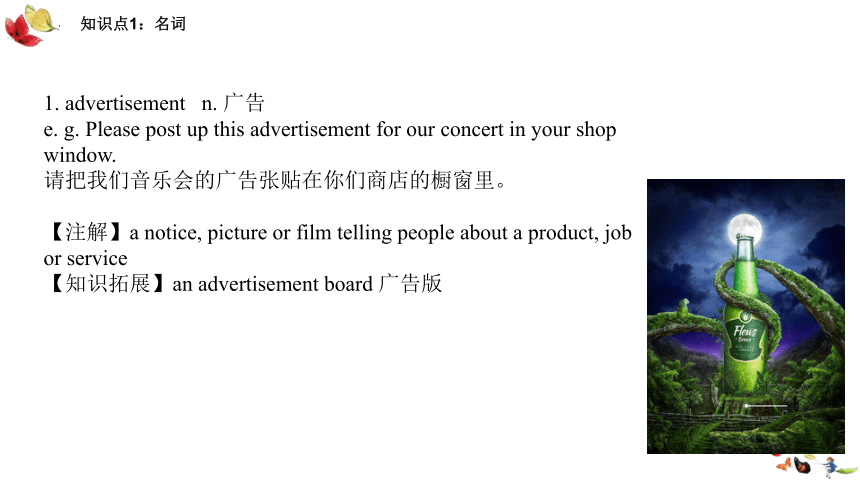
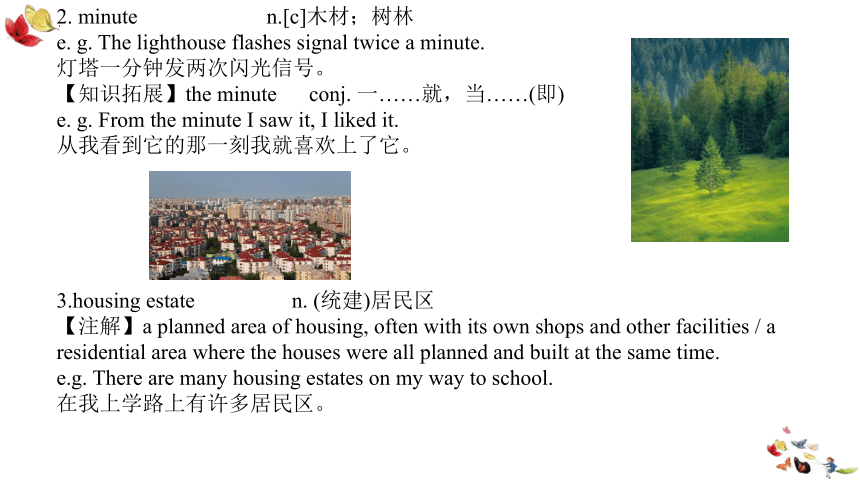
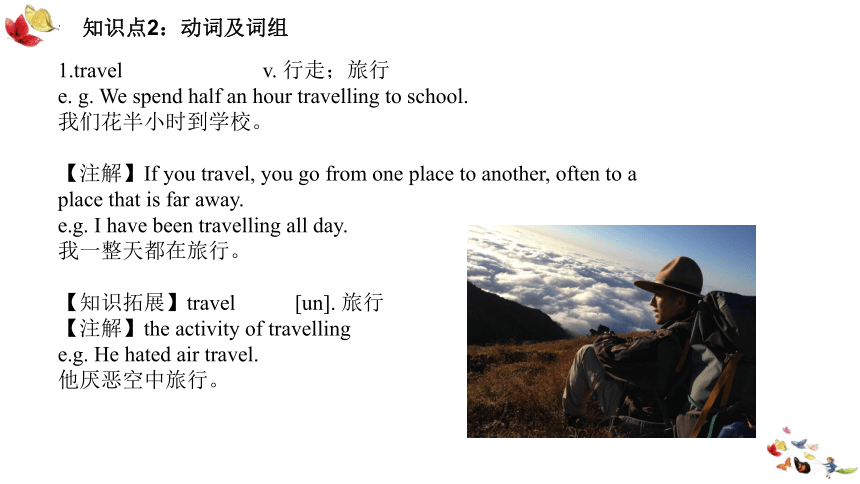
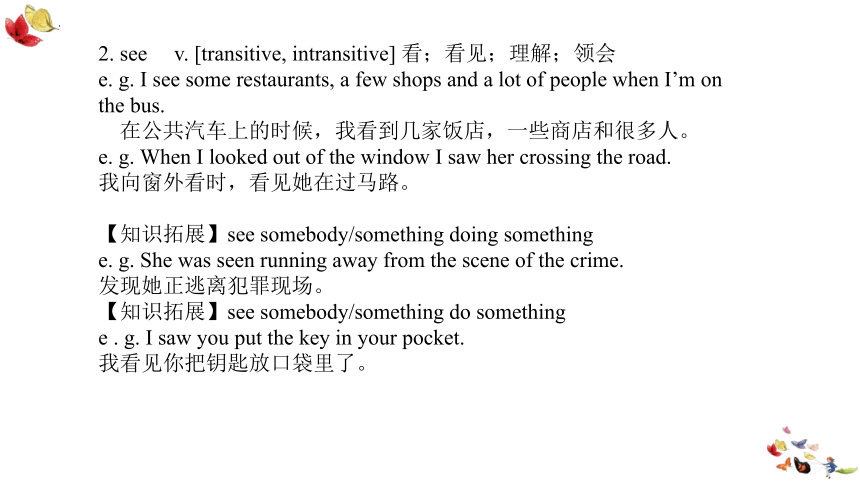
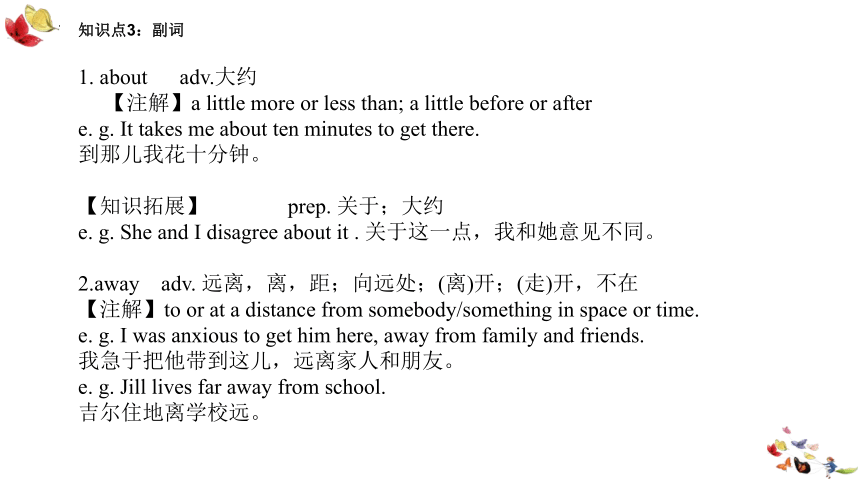
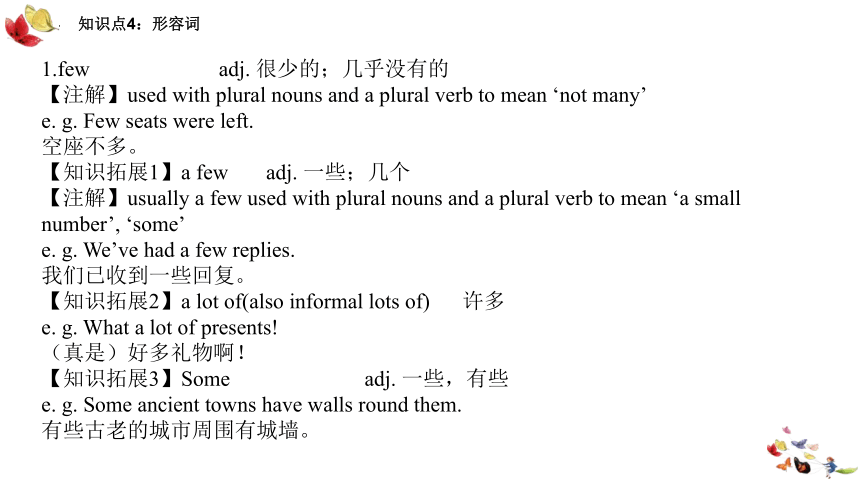
文档简介
(共16张PPT)
Words
同步词汇及拓展延伸
Unit6 Going to school
1. advertisement n. 广告
e. g. Please post up this advertisement for our concert in your shop window.
请把我们音乐会的广告张贴在你们商店的橱窗里。
【注解】a notice, picture or film telling people about a product, job or service
【知识拓展】an advertisement board 广告版
知识点1:名词
2. minute n.[c]木材;树林
e. g. The lighthouse flashes signal twice a minute.
灯塔一分钟发两次闪光信号。
【知识拓展】the minute conj. 一……就,当……(即)
e. g. From the minute I saw it, I liked it.
从我看到它的那一刻我就喜欢上了它。
3.housing estate n. (统建)居民区
【注解】a planned area of housing, often with its own shops and other facilities / a residential area where the houses were all planned and built at the same time.
e.g. There are many housing estates on my way to school.
在我上学路上有许多居民区。
知识点2:动词及词组
1.travel v. 行走;旅行
e. g. We spend half an hour travelling to school.
我们花半小时到学校。
【注解】If you travel, you go from one place to another, often to a place that is far away.
e.g. I have been travelling all day.
我一整天都在旅行。
【知识拓展】travel [un]. 旅行
【注解】the activity of travelling
e.g. He hated air travel.
他厌恶空中旅行。
2. see v. [transitive, intransitive] 看;看见;理解;领会
e. g. I see some restaurants, a few shops and a lot of people when I’m on the bus.
在公共汽车上的时候,我看到几家饭店,一些商店和很多人。
e. g. When I looked out of the window I saw her crossing the road.
我向窗外看时,看见她在过马路。
【知识拓展】see somebody/something doing something
e. g. She was seen running away from the scene of the crime.
发现她正逃离犯罪现场。
【知识拓展】see somebody/something do something
e . g. I saw you put the key in your pocket.
我看见你把钥匙放口袋里了。
知识点3:副词
1. about adv.大约
【注解】a little more or less than; a little before or after
e. g. It takes me about ten minutes to get there.
到那儿我花十分钟。
【知识拓展】 prep. 关于;大约
e. g. She and I disagree about it . 关于这一点,我和她意见不同。
2.away adv. 远离,离,距;向远处;(离)开;(走)开,不在
【注解】to or at a distance from somebody/something in space or time.
e. g. I was anxious to get him here, away from family and friends.
我急于把他带到这儿,远离家人和朋友。
e. g. Jill lives far away from school.
吉尔住地离学校远。
知识点4:形容词
1.few adj. 很少的;几乎没有的
【注解】used with plural nouns and a plural verb to mean ‘not many’
e. g. Few seats were left.
空座不多。
【知识拓展1】a few adj. 一些;几个
【注解】usually a few used with plural nouns and a plural verb to mean ‘a small number’, ‘some’
e. g. We’ve had a few replies.
我们已收到一些回复。
【知识拓展2】a lot of(also informal lots of) 许多
e. g. What a lot of presents!
(真是)好多礼物啊!
【知识拓展3】Some adj. 一些,有些
e. g. Some ancient towns have walls round them.
有些古老的城市周围有城墙。
知识点4:介词
1.by prep. 通过;被;依据;经由;在附近;在……之前【注解】used for showing how or in what way something is donee. g. He goes to school by bus. 他乘公共汽车去学校。 【知识拓展1】to travel by car/plane/ferry/underground乘船/汽车/飞机/渡船/地铁去旅行e. g. She goes to school by ferry. 她乘渡船去学校。e. g. He goes to school by underground. 他乘地铁。 e. g. John used to travel by plane at least once a month on business.约翰过去为了他的生意至少一个月得乘一次飞机 【知识拓展2】其他表示交通方式介词词组:e. g. They go to school on foot.我们步行去学校。
知识点5:连词
1.when conj.当……时;在……时;考虑到;既然;如果【注解】at or during the time thate. g. I see some restaurants, a few shops and a lot of people when I’m on the bus. 在公共汽车上的时候,我看到几家饭店,一些商店和很多人。e. g. I see a few parents, some teachers and a lot of students when I’m walking to school. 当我步行去学校时,我看见几个家长,一些老师和许多学生。
【知识拓展】when adv. 在……时(用于定语从句做关系副词)【注解】used after an expression of time to mean ‘at which’ or ‘on which’e. g. Sunday is the only day when I can relax. 星期天是唯一让我放松的一天。
知识点6:句型
1.when的用法: What does Simon see when he is… I see… when I am… e. g. I see a few supermarkets when I go to school by taxi. 当我乘的士时我看到几家超市。
2. ‘How’ questions 特殊疑问句对时间长短提问 e. g. How long does it take you to get to your friend’s home 到你朋友家要多长时间?e. g. It takes me about half an hour to get to the post office. 到邮局要花我半小时。
Using
用所给单词的正确形式填空1.It only takes him 20 minutes (drive) his office every day.2.Many years ago, the old man (live) in the forest.3.Emma (not like) tennis. She likes soccer.4. (hundred) of people are in the shopping centre.5.My little brother is only one (year) old.6.These pictures are those (art).7.Look! Here are three (car).8.The (village) there often sing and dance at the Spring Festival.9.She thinks of (go)to the movies with her parents on the weekend.10.It’s difficult for an old man (ride)a horse.11.There are lots of films (watch) in Sunshine Town.12.— It’s late. You should have your breakfast (quick).— OK, Mom.13.He says his bike is broken, so he (have) to go to school by bus.14.How long does it take (get) to Shanghai from Beijing by plane 15.I love my teacher. He is (like) a father to me.
Keys
1.to drive
【详解】句意:他每天开车去办公室只需20分钟。此处是结构“It takes sb+时间+to do sth”,空处用不定式形式,故填to drive。
2.lived
【详解】句意:许多年前,这位老人住在森林里。根据“Many years ago”可知,时态是一般过去时,动词用过去式,故填lived。
3.doesn’t like
【详解】句意:艾玛不喜欢网球。她喜欢足球。根据“She likes soccer.”可知,时态为一般现在时,like“喜欢”为实义动词,“Emma”为第三人称单数,表示否定要用助动词doesn’t,后接动词原形。故填doesn’t like。
4.Hundreds
【详解】句意:数百人在购物中心。hundred意为“百”,表示“几百”时,前面通常加基数词,且hundred不能加s;hundreds of为固定短语,意为“数以百计的,成百上千的”hundreds前不能加基数词,且s不能去掉,后面需要加名词复数,故填Hundreds。
5.year
【详解】句意:我的小弟弟只有一岁。year是“年”可数名词,因前面有基数词one,所以这里用其单数形式,故答案填year。
6.artists’
【详解】句意:这些画是那些艺术家的。根据These pictures are those ___(art).可知句意为:“这些画是那些艺术家的。”“艺术家”artist,由前面的those可知这里用其复数artists,而且空格后面没有名词,所以要用其所有格形式,以s结尾的名词,所有格直接在其后加“’”;故答案填artists’。
7.cars
【详解】句意:看!这是三辆汽车。根据空前的“three”可知,应该填的是可数名词car“汽车”的复数cars,故填cars。
8.villagers
【详解】句意:那儿的村民经常在春节唱歌跳舞。根据“often”可知,时态是一般现在时,由“often sing and dance at the Spring Festival”可知,应该是那儿的村民经常在春节唱歌跳舞,用可数名词复数villagers“村民”,故填villagers。
9.going
【详解】句意:她想周末和父母一起去看电影。of是介词,后接动名词,故填going。
10.to ride
【详解】句意:对一个老人来说骑马是很困难的。固定句式:It’s+形容词+for sb to do sth“对于某人来说,做某事是……的”,动词不定式作主语,故填to ride。
11.to watch
【详解】句意:在阳光镇有很多电影可以看。分析句子结构可知这里是动词不定式作后置定语,表示有很多电影要看,所以这里用to watch填空;故填to watch。
12.quickly
【详解】句意:——很晚了。你应该快速地吃早饭。——好的,妈妈。根据空前的“have your breakfast”可知,应该填的是quick的副词quickly“快速地”修饰动词,故填quickly。
13.has
【详解】句意:他说他的自行车坏了,所以他不得不坐公共汽车去上学。根据says可知,此句是一般现在时,主语he是第三人称单数形式,动词用三单,故填has。
14.to get
【详解】句意:从北京坐飞机到上海要多长时间?本句是句型“It takes some time to do sth.(做某事要花多长时间)”的特殊疑问句。故填to get。
15.like
【详解】句意:我爱我的老师。他对我就像我的父亲一样。be like sb to sb表示“对某人就像某人一样”,固定用法。故填like。
Using
it afraid like between cross
In a very small village, there is a very big river 16 the school and the village. There is no bridge and the river runs too quickly for boats. So the students go on the ropeway to cross the river to school. Liangliang 17 the river every school day. But he is not 18 because he loves school. “I love to play with my classmates. And I love my teacher. He’s 19 a father to me.”Many of the students and villagers never leave the village. 20 is their dream to have a bridge.
Keys
16.between 17.crosses 18.afraid 19.like 20.It
【分析】本文主要讲述的是山村的孩子上学路途的艰难以及建一座桥的梦想。
16.句意:在一个非常小的村庄里,学校和村庄之间有一条非常大的河流。根据题意可知,本题考查固定搭配between…and…“在……之间”。故填between。
17.句意:梁亮每天上学都要过河。根据“So the students go on the ropeway to cross the river to school”可知,梁亮每天要过这条河,故空格上填动词cross。因为句子的主语“Liangliang”是第三人称单数,故填crosses。
18.句意:但他并不害怕,因为他热爱学校。根据句意可知,本空格所填词为形容词,在句中作表语。根据所给词可知,只有afraid“害怕的”,是形容词。故填afraid。
19.句意:他就像我的父亲。根据题意可知,本题考查be like“像……一样”。故填like。
20.句意:拥有一座桥是他们的梦想。根据句意可知,本题考查it作形式主语,真正的主语是句子中的动词不定式。故填It。
Using
从方框中选词并用其适当形式完成短文,使短文完整、通顺。(walk, take, have, off, near, from, come, how, minute, or)Dear Rose,I’m very glad you are 21 to visit me. Now I will tell you 22 to get to my home. After you get 23 the train at the railway station, you can 24 the No.8 bus to Yingbin Road. It may take you 25 to get to the bus stop. The bus stop is very 26 to my home. 27 you can take a taxi. That’s much faster.By the way, it’s not far 28 my home to the beach, so we can 29 there every day. I hope you will 30 a good time here.Best wishes!
Yours,Mary
Keys
21.coming 22.how 23.off 24.take 25.minutes 26.near 27.Or 28.from 29.walk 30.have
【分析】本文是玛丽写信给罗斯介绍从火车站到她家的路线。
21.句意:我很高兴你将来看望我。be coming to do sth. 将要来做某事。故此处用coming。
22.句意:现在我来告诉你怎样去我家。根据After you get 3 the train at the railway station,you can 4 the No.8 bus to Yingbin Road.可知此处介绍到我家的方式,故用疑问词how。
23.句意:你在火车站下车后。get off下车的意思。故此处填off。
24.句意:你可以乘8路车到迎宾路。乘几路车用take。
25.句意:到公共汽车站可能要30分钟。有数词thirty修饰,故此处用复数名词,此处介绍做公交车到我家,因此是30分钟,故为minutes。
26.句意:公共汽车站离我家很近。结合句意可知用near。
27.句意:或者你可以坐出租车。or表示选择。故用or。
28.句意:顺便说一下,我家离海滩不远。far from远离,故用from。
29.句意:所以我们可以每天步行去那里。因为玛丽的家离海滩不远,可以步行去。故用walk。
30.句意:我希望你在这里过得愉快。have a good time过得愉快。故用have。
Words
同步词汇及拓展延伸
Unit6 Going to school
1. advertisement n. 广告
e. g. Please post up this advertisement for our concert in your shop window.
请把我们音乐会的广告张贴在你们商店的橱窗里。
【注解】a notice, picture or film telling people about a product, job or service
【知识拓展】an advertisement board 广告版
知识点1:名词
2. minute n.[c]木材;树林
e. g. The lighthouse flashes signal twice a minute.
灯塔一分钟发两次闪光信号。
【知识拓展】the minute conj. 一……就,当……(即)
e. g. From the minute I saw it, I liked it.
从我看到它的那一刻我就喜欢上了它。
3.housing estate n. (统建)居民区
【注解】a planned area of housing, often with its own shops and other facilities / a residential area where the houses were all planned and built at the same time.
e.g. There are many housing estates on my way to school.
在我上学路上有许多居民区。
知识点2:动词及词组
1.travel v. 行走;旅行
e. g. We spend half an hour travelling to school.
我们花半小时到学校。
【注解】If you travel, you go from one place to another, often to a place that is far away.
e.g. I have been travelling all day.
我一整天都在旅行。
【知识拓展】travel [un]. 旅行
【注解】the activity of travelling
e.g. He hated air travel.
他厌恶空中旅行。
2. see v. [transitive, intransitive] 看;看见;理解;领会
e. g. I see some restaurants, a few shops and a lot of people when I’m on the bus.
在公共汽车上的时候,我看到几家饭店,一些商店和很多人。
e. g. When I looked out of the window I saw her crossing the road.
我向窗外看时,看见她在过马路。
【知识拓展】see somebody/something doing something
e. g. She was seen running away from the scene of the crime.
发现她正逃离犯罪现场。
【知识拓展】see somebody/something do something
e . g. I saw you put the key in your pocket.
我看见你把钥匙放口袋里了。
知识点3:副词
1. about adv.大约
【注解】a little more or less than; a little before or after
e. g. It takes me about ten minutes to get there.
到那儿我花十分钟。
【知识拓展】 prep. 关于;大约
e. g. She and I disagree about it . 关于这一点,我和她意见不同。
2.away adv. 远离,离,距;向远处;(离)开;(走)开,不在
【注解】to or at a distance from somebody/something in space or time.
e. g. I was anxious to get him here, away from family and friends.
我急于把他带到这儿,远离家人和朋友。
e. g. Jill lives far away from school.
吉尔住地离学校远。
知识点4:形容词
1.few adj. 很少的;几乎没有的
【注解】used with plural nouns and a plural verb to mean ‘not many’
e. g. Few seats were left.
空座不多。
【知识拓展1】a few adj. 一些;几个
【注解】usually a few used with plural nouns and a plural verb to mean ‘a small number’, ‘some’
e. g. We’ve had a few replies.
我们已收到一些回复。
【知识拓展2】a lot of(also informal lots of) 许多
e. g. What a lot of presents!
(真是)好多礼物啊!
【知识拓展3】Some adj. 一些,有些
e. g. Some ancient towns have walls round them.
有些古老的城市周围有城墙。
知识点4:介词
1.by prep. 通过;被;依据;经由;在附近;在……之前【注解】used for showing how or in what way something is donee. g. He goes to school by bus. 他乘公共汽车去学校。 【知识拓展1】to travel by car/plane/ferry/underground乘船/汽车/飞机/渡船/地铁去旅行e. g. She goes to school by ferry. 她乘渡船去学校。e. g. He goes to school by underground. 他乘地铁。 e. g. John used to travel by plane at least once a month on business.约翰过去为了他的生意至少一个月得乘一次飞机 【知识拓展2】其他表示交通方式介词词组:e. g. They go to school on foot.我们步行去学校。
知识点5:连词
1.when conj.当……时;在……时;考虑到;既然;如果【注解】at or during the time thate. g. I see some restaurants, a few shops and a lot of people when I’m on the bus. 在公共汽车上的时候,我看到几家饭店,一些商店和很多人。e. g. I see a few parents, some teachers and a lot of students when I’m walking to school. 当我步行去学校时,我看见几个家长,一些老师和许多学生。
【知识拓展】when adv. 在……时(用于定语从句做关系副词)【注解】used after an expression of time to mean ‘at which’ or ‘on which’e. g. Sunday is the only day when I can relax. 星期天是唯一让我放松的一天。
知识点6:句型
1.when的用法: What does Simon see when he is… I see… when I am… e. g. I see a few supermarkets when I go to school by taxi. 当我乘的士时我看到几家超市。
2. ‘How’ questions 特殊疑问句对时间长短提问 e. g. How long does it take you to get to your friend’s home 到你朋友家要多长时间?e. g. It takes me about half an hour to get to the post office. 到邮局要花我半小时。
Using
用所给单词的正确形式填空1.It only takes him 20 minutes (drive) his office every day.2.Many years ago, the old man (live) in the forest.3.Emma (not like) tennis. She likes soccer.4. (hundred) of people are in the shopping centre.5.My little brother is only one (year) old.6.These pictures are those (art).7.Look! Here are three (car).8.The (village) there often sing and dance at the Spring Festival.9.She thinks of (go)to the movies with her parents on the weekend.10.It’s difficult for an old man (ride)a horse.11.There are lots of films (watch) in Sunshine Town.12.— It’s late. You should have your breakfast (quick).— OK, Mom.13.He says his bike is broken, so he (have) to go to school by bus.14.How long does it take (get) to Shanghai from Beijing by plane 15.I love my teacher. He is (like) a father to me.
Keys
1.to drive
【详解】句意:他每天开车去办公室只需20分钟。此处是结构“It takes sb+时间+to do sth”,空处用不定式形式,故填to drive。
2.lived
【详解】句意:许多年前,这位老人住在森林里。根据“Many years ago”可知,时态是一般过去时,动词用过去式,故填lived。
3.doesn’t like
【详解】句意:艾玛不喜欢网球。她喜欢足球。根据“She likes soccer.”可知,时态为一般现在时,like“喜欢”为实义动词,“Emma”为第三人称单数,表示否定要用助动词doesn’t,后接动词原形。故填doesn’t like。
4.Hundreds
【详解】句意:数百人在购物中心。hundred意为“百”,表示“几百”时,前面通常加基数词,且hundred不能加s;hundreds of为固定短语,意为“数以百计的,成百上千的”hundreds前不能加基数词,且s不能去掉,后面需要加名词复数,故填Hundreds。
5.year
【详解】句意:我的小弟弟只有一岁。year是“年”可数名词,因前面有基数词one,所以这里用其单数形式,故答案填year。
6.artists’
【详解】句意:这些画是那些艺术家的。根据These pictures are those ___(art).可知句意为:“这些画是那些艺术家的。”“艺术家”artist,由前面的those可知这里用其复数artists,而且空格后面没有名词,所以要用其所有格形式,以s结尾的名词,所有格直接在其后加“’”;故答案填artists’。
7.cars
【详解】句意:看!这是三辆汽车。根据空前的“three”可知,应该填的是可数名词car“汽车”的复数cars,故填cars。
8.villagers
【详解】句意:那儿的村民经常在春节唱歌跳舞。根据“often”可知,时态是一般现在时,由“often sing and dance at the Spring Festival”可知,应该是那儿的村民经常在春节唱歌跳舞,用可数名词复数villagers“村民”,故填villagers。
9.going
【详解】句意:她想周末和父母一起去看电影。of是介词,后接动名词,故填going。
10.to ride
【详解】句意:对一个老人来说骑马是很困难的。固定句式:It’s+形容词+for sb to do sth“对于某人来说,做某事是……的”,动词不定式作主语,故填to ride。
11.to watch
【详解】句意:在阳光镇有很多电影可以看。分析句子结构可知这里是动词不定式作后置定语,表示有很多电影要看,所以这里用to watch填空;故填to watch。
12.quickly
【详解】句意:——很晚了。你应该快速地吃早饭。——好的,妈妈。根据空前的“have your breakfast”可知,应该填的是quick的副词quickly“快速地”修饰动词,故填quickly。
13.has
【详解】句意:他说他的自行车坏了,所以他不得不坐公共汽车去上学。根据says可知,此句是一般现在时,主语he是第三人称单数形式,动词用三单,故填has。
14.to get
【详解】句意:从北京坐飞机到上海要多长时间?本句是句型“It takes some time to do sth.(做某事要花多长时间)”的特殊疑问句。故填to get。
15.like
【详解】句意:我爱我的老师。他对我就像我的父亲一样。be like sb to sb表示“对某人就像某人一样”,固定用法。故填like。
Using
it afraid like between cross
In a very small village, there is a very big river 16 the school and the village. There is no bridge and the river runs too quickly for boats. So the students go on the ropeway to cross the river to school. Liangliang 17 the river every school day. But he is not 18 because he loves school. “I love to play with my classmates. And I love my teacher. He’s 19 a father to me.”Many of the students and villagers never leave the village. 20 is their dream to have a bridge.
Keys
16.between 17.crosses 18.afraid 19.like 20.It
【分析】本文主要讲述的是山村的孩子上学路途的艰难以及建一座桥的梦想。
16.句意:在一个非常小的村庄里,学校和村庄之间有一条非常大的河流。根据题意可知,本题考查固定搭配between…and…“在……之间”。故填between。
17.句意:梁亮每天上学都要过河。根据“So the students go on the ropeway to cross the river to school”可知,梁亮每天要过这条河,故空格上填动词cross。因为句子的主语“Liangliang”是第三人称单数,故填crosses。
18.句意:但他并不害怕,因为他热爱学校。根据句意可知,本空格所填词为形容词,在句中作表语。根据所给词可知,只有afraid“害怕的”,是形容词。故填afraid。
19.句意:他就像我的父亲。根据题意可知,本题考查be like“像……一样”。故填like。
20.句意:拥有一座桥是他们的梦想。根据句意可知,本题考查it作形式主语,真正的主语是句子中的动词不定式。故填It。
Using
从方框中选词并用其适当形式完成短文,使短文完整、通顺。(walk, take, have, off, near, from, come, how, minute, or)Dear Rose,I’m very glad you are 21 to visit me. Now I will tell you 22 to get to my home. After you get 23 the train at the railway station, you can 24 the No.8 bus to Yingbin Road. It may take you 25 to get to the bus stop. The bus stop is very 26 to my home. 27 you can take a taxi. That’s much faster.By the way, it’s not far 28 my home to the beach, so we can 29 there every day. I hope you will 30 a good time here.Best wishes!
Yours,Mary
Keys
21.coming 22.how 23.off 24.take 25.minutes 26.near 27.Or 28.from 29.walk 30.have
【分析】本文是玛丽写信给罗斯介绍从火车站到她家的路线。
21.句意:我很高兴你将来看望我。be coming to do sth. 将要来做某事。故此处用coming。
22.句意:现在我来告诉你怎样去我家。根据After you get 3 the train at the railway station,you can 4 the No.8 bus to Yingbin Road.可知此处介绍到我家的方式,故用疑问词how。
23.句意:你在火车站下车后。get off下车的意思。故此处填off。
24.句意:你可以乘8路车到迎宾路。乘几路车用take。
25.句意:到公共汽车站可能要30分钟。有数词thirty修饰,故此处用复数名词,此处介绍做公交车到我家,因此是30分钟,故为minutes。
26.句意:公共汽车站离我家很近。结合句意可知用near。
27.句意:或者你可以坐出租车。or表示选择。故用or。
28.句意:顺便说一下,我家离海滩不远。far from远离,故用from。
29.句意:所以我们可以每天步行去那里。因为玛丽的家离海滩不远,可以步行去。故用walk。
30.句意:我希望你在这里过得愉快。have a good time过得愉快。故用have。
同课章节目录
- Module 1 Family and friends
- Unit 1 Family and relatives
- Unit 2 I have a good friend
- Unit 3 Spending a day out togethe
- Module 2 Places and activities
- Unit 4 What would you like to be?
- Unit 5 Open Day
- Unit 6 Going to school
- Unit 7 Rules round us
- Module 3 Food and drink
- Unit 8 The food we eat
- Unit 9 Picnics are fun
- Unit 10 Healthy eating
- Unit 11 Let's make a pizza
